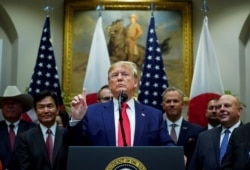As Turkey last month announced its military incursion into northeast Syria, Turkish officials said the operation was to "prevent the creation of a terror corridor" along Turkey’s southern border with Syria. Locally, however, their message added a religious zeal to the Muslim nation by depicting the offensive as an Islamic struggle against "infidels."
Some experts and observers of the country say the government’s religious messaging is a mixture of ideology and political propaganda aimed at promoting President Recep Tayyip Erdogan’s ambition to be seen as the leader and protector of the Muslim world.
While announcing the operation on October 9, Erdogan tweeted in English that the operation by the Turkish army and its allied Syrian militants was to "neutralize terror threats" against Turkey by the Kurds and to establish a safe zone for the return of Syrian refugees. In his tweets in Turkish and Arabic, however, he described the forces as "the heroes of the Mohammadian Army" — a term dating back to the Ottoman Empire.
Days into the operation, Erdogan in several public speeches framed it in religious terms, claiming it was to protect the dignity of the ummah, or the Muslim world. During a speech at the ruling Justice and Development Party (AKP) group meeting on October 29, he praised the Turkey-backed Syrian rebels as "jihadists who even intimidate and kill death itself."
Aykan Erdemir, a former Turkish lawmaker at the Washington-based Foundation for Defense of Democracies, told VOA that Erdogan, since the establishment of the ruling AKP party in 2001, has attempted to portray himself to the West as a liberal democratic reformer while promoting a religious tone at home.
"Reframing secular policy debates within the rhetoric of political Islam is one of the strategies Erdogan has used to strengthen his ideological hegemony," said Erdemir, adding that the rhetoric can be used as an effective social engineering tool in the country.
"To this day, he has continued to use Islamist jargon to cater to his loyalists at home and abroad, while deploying a sanitized rhetoric to address his Western audiences," he told VOA.
On October 25, after Friday's prayer in an Istanbul mosque, Erdogan gave a speech citing the Quran and telling the worshippers that Allah has promised a victory to Muslims and commanded them to be hard on "infidels."
Syria operation ordained by God
Citing religion for the offensive against U.S.-backed forces was not limited to Erdogan’s speeches.
Across Turkey’s mosques, the Diyanet, or the directorate of religious affairs, organized calls to prayer and recitation of the "Conquest" chapter in the Quran, broadcasting it over loudspeakers. Turkish mainstream media, including state-run Anadolu Agency, broadcast Islamic clerics telling followers the northeast Syria operation was ordained by God.
The pro-government media outlet shared dozens of posts allegedly showing Muslims from around the world reciting the "Conquest" chapter of the Quran in support of the Turkish military.
Abdullah Bozkurt, a Turkish author and the director of Nordic Research and Monitoring Network, told VOA that utilizing religious institutions continues to pay off for Erdogan to mobilize his supporters, especially the hard-core religious base that is crucial for his political survival.
Through appealing to religious symbols and Islamic congregations, Bozkurt said, Erdogan sees an opportunity to also gain the sympathy of both Turkish and non-Turkish Muslim diaspora groups in the West.
"This, he thinks, helps him gain leverage and enhance his bargaining power with the Western policymakers. This was often displayed when Erdoğan made trips to the U.S. and European capitals where he had always met with Muslim and religious figures in a town hall meeting to deliver speeches with religious flavors," he told VOA.
Michael Rubin, a resident scholar at the American Enterprise Institute (AEI), warned that the continued usage of religion by Turkish officials to justify their policies could spark a set of issues that the Turkish society will likely grapple with for years to come.
"After 16 years of Erdoganism, a whole generation of indoctrinated Turkish schoolchildren and Turkish military officers have fundamentally changed Turkey," he said, adding that the strategy will likely also affect Turkey’s relations with Western countries that are concerned about the direction Turkey is headed.
"For those who have been watching Erdogan, it's very worrisome," Rubin said. He added that the pan-Islamic messaging is often coined with promoting incitement against the West, particularly when interests diverge in developments such as in northeast Syria.
Plotting a divide
The United States and its European allies have criticized Turkey’s operation against the Kurdish forces. U.S. President Donald Trump has vowed to impose devastating sanctions and the European Union limited arms exports to Turkey in reaction to the offensive.
In return, Turkish officials have accused the West of plotting to divide the Muslim world and spread conflict among Muslim nations to extract their wealth.
During a press conference in Antalya, Turkey, Saturday, Turkish Foreign Affairs Minister Mevlut Cavusoglu said their Syria operation thwarted a Western plot to create a "terror state" in northeast Syria by empowering Kurdish forces.
"A group of countries led by Israel wanted to establish a terror state in northern Syria and we foiled their plans," Cavusoglu said during a joint press conference with Hadi Soleimanpour, an adviser to the Iranian foreign ministry and secretary general of Economic Cooperation Organization.
Turkish Interior Minister Suleyman Soylu has made similar remarks, slamming the West, which according to him has "sworn to eliminate Islam and its people from these lands."
Max Hoffman, a Turkey expert at Washington-based Center for American Progress, charged that Turkish officials’ rhetoric about the West reflects a fundamental change in their view of the U.S. influence in the world.
"More broadly, he and his inner circle believe the world is multipolar and the U.S. is in decline. They want Turkey to be a power in its own right," Hoffman said, adding this worldview has led Erdogan to adopt a transactional approach toward the U.S. and Europe and cultivate ties with Iran, China and especially Russia.
While Erdogan will likely continue to cultivate religious support, Hoffman said it is unlikely that this policy could cause an "Islamization of Turkey."
"Erdogan’s goal of raising a 'pious generation' is possibly backfiring but, at a minimum, has not been realized. But while society in the aggregate appears to becoming less religious, there is certainly concern in Turkey about small subsets of the population that have become increasingly radical in their religious views. Personally, I doubt Turkish society will move very far in that direction," he told VOA.






